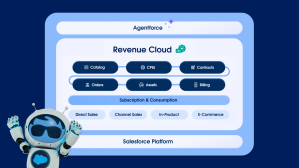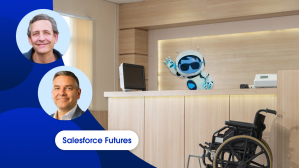One measure of a good physician is how well they handle tough questions.
In the Miami clinic where I practice, I’m used to quashing confusion, whether it’s from the older couple who doesn’t understand the implications of a diabetes diagnosis or the young man who wonders whether a diet of energy drinks and supplements can prevent disease. Most patients want the same thing: clarity.
When COVID-19 hit, I started fielding questions outside the clinic, too. Suddenly, my coworkers, fellow PTA parents, and family didn’t know what to do. The confusion has yet to end.
But pandemic-related uncertainty, the worsening addiction crisis, threats to healthcare for women and transgender people, and so many other health topics that have risen to the surface over the past few years made one thing clear: Healthcare is the issue of the decade.
That means health is your business, no matter your industry.
As Chief Medical Officer at Salesforce, I’m always thinking about how we can better serve our employees through health and wellness efforts, exceed our healthcare and life sciences customers’ expectations, and safeguard our entire community.
That means I also have to anticipate the questions our stakeholders will raise tomorrow. After two years spent analyzing COVID-era health and care, I have developed five healthcare predictions that stand to shake up every business — and ideas for how they can be addressed.
Sustainability will promote better health outcomes
The pandemic showed us that everyone’s health is connected, no matter where we live.
Global health risks affect communities in many ways. The recent surge in food prices threatens to push millions into food insecurity, opening up more people to negative effects like cognitive conditions, birth defects, and anxiety. The world’s economy, meanwhile, could be heading for a rough patch, which threatens to derail healthy behaviors and amplify health inequities. And climate change continues to hurt communities and raise the risk of infectious disease.
The overarching message: Stabilizing our world will lead to better health outcomes.
That means health is your business, no matter your industry.
DR. Geeta Nayyar
So, what can businesses do? Prioritize sustainable practices that conserve resources, fight climate change, and promote health equity. Even rethinking real estate can further environmental and economic goals — while also boosting employee happiness and health.
At Salesforce, sustainability is a core value. We use our technology to help organizations accelerate their journeys to net zero emissions and greater health equity. In doing so, and with climate-based investments, we aim to act as a platform for change.
When other businesses join us, we amplify this work. Just as crises ripple across the world, so can progress.
Mental health will demand employer action
We’re facing an alarming mental health crisis.
The pandemic jolted global rates of major depressive disorder up by nearly 28% and anxiety disorder by about 26%. In the United States, a third of high school students and half of female students feel persistent sadness or hopelessness.
As the U.S. surgeon general warned: “It would be a tragedy if we beat back one public health crisis only to allow another to grow in its place.”
But the pandemic also inspired cause for hope: Confined to our homes, more people drew on our shared experiences and started discussing loneliness and anxiety. That openness helped destigmatize our struggles, placing mental health on the agenda.
Now it’s time for companies to do their part by surveying employees’ needs and designing strategies to meet them. That’s good for business, considering the strong link between employee happiness and customer satisfaction.
At Salesforce, we developed a five-pronged support system to improve mental health. As President and Chief People Officer Brent Hyder said, “Without our people, we have nothing.”
Employee happiness will improve physical health and ultimately drive business outcomes
As unmanaged and chronic workplace stress piles up, the effects won’t end with employee mental health and organizational productivity.
As many as 79% of people reported workplace stress in 2021. Forty-four percent of workers also felt physical fatigue, a nearly 40% jump from before COVID. The numbers are especially alarming when we consider that burnout is a known predictor of disease, from type 2 diabetes to respiratory ailments.
If there were ever a cycle that businesses need to break, it’s one where work-induced mental health issues incite equally serious physical health crises.
We can’t expect individuals to adapt to unreasonable adversity. Instead, organizations need to create a culture that nurtures and empowers people to overcome stress, burnout, and physical health risks at scale.
Leaders need to recognize human limits and scale resilience-building practices. Physical activity, sleep, and mindfulness breaks are all important. So are opportunities to play, especially in the face of daunting challenges.
At Salesforce, we empower employees to choose certain wellness benefits. That means I can opt for the company to cover massages, ski lift tickets, or my gym membership. A customizable, whole-person approach to health and wellness reinforces mental and physical health.
As more companies adopt resilience strategies, it will become a must for recruitment. Who doesn’t want to work for a business that prioritizes employee happiness?
Their well-being is simply good for business. After all, healthy and happy employees deliver greater productivity and better outcomes.
Healthcare innovation will continue to accelerate
The refrain is familiar but true: We may be done with COVID, but it’s not done with us. As variants emerge, new waves spike, and long COVID persists, the world’s best scientists and doctors are summoning the same style of innovation that helped us make it through the pandemic’s early days.
They developed and distributed three vaccines in record time. The healthcare system, meanwhile, adopted virtual care technologies almost overnight, preserving access to care as clinics shuttered.
Businesses, for their part, must carry forward this innovative spirit to help advance healthcare.
Leaders should double down on funding cutting-edge studies while nurturing international collaboration for medical research. And businesses need to innovate around the customer, creating powerful connections among healthcare organizations, clinicians, and patients.
Personalized experiences start with technology that creates a 360-degree view of the customer and connects disparate systems, empowering organizations to leverage automation. That enables healthcare and life sciences to simultaneously increase efficiencies and expand access to trusted care from anywhere.
The pandemic proved that this industry has what it takes to evolve in the face of shifting customer expectations. Why not harness that momentum?
Businesses know how to leverage the spirit of innovation. By directing that skill to health, care, and wellness, we can develop real solutions that improve global health.
Trust will remain as important as it is elusive
The annual Edelman Trust Barometer paints a bleak picture of a global society in which nearly half of us consider the government and media as divisive forces. Misinformation is everywhere, and people are losing faith that institutions can provide leadership or solutions.
But in this era of cynicism, businesses maintain confidence. Seventy-seven percent of the survey’s respondents said they trust their employer. In Salesforce’s latest “State of the Connected Customer” report, 68% of consumers said they trust companies to act with society’s best interest in mind, an incredible 15% increase from the prior year. And 8% of customers believe trust is most crucial during times of change — like right now.
Business leaders should be careful not to squander this goodwill. Because only 23% of people completely trust the healthcare industry, employers are in a unique position to step in and promote good health.
Building trust starts with acknowledging challenges. There’s little tolerance left for toxic positivity or tone deafness in the workplace. Translation: Employees and partners see right through companies that pretend a “return to normalcy” is desirable or even possible.
The key is open and honest communication. At Salesforce, for instance, I host a series of talks called “What’s Up Doc?” It’s a space where employees can bring healthcare questions, from lofty public-health issues to in-depth, individual concerns. We embrace the truth, and trust follows.
These talks work because my position as Chief Medical Officer signals credibility for both me and the organization. By hiring for similar roles and leveraging medical experts to make big decisions, companies show that employee health matters.
Will you strive to deliver clarity?
Not long ago, I began speaking with my patients about how to spot and stop the spread of misinformation. Combating falsehoods at scale requires more than a single physician’s words. But each conversation might help one patient find the truth — and that’s worth something.
Companies, too, have the opportunity to make a difference. Our work won’t eliminate uncertainty or negative health outcomes, but we can reduce them.
COVID proved that good health depends on our willingness to answer hard questions and find solutions to complicated problems. But businesses must choose to try. Don’t our employees, customers, and communities deserve the effort?
Learn how Salesforce approaches cloud-based healthcare in this blog post.



















